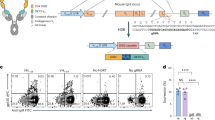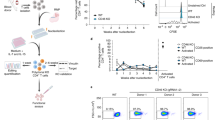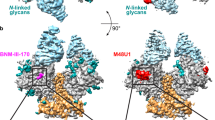Abstract
CD4 is a cell surface glycoprotein that acts as a co-receptor for the T cell antigen receptor by binding to a non-polymorphic portion of MHC molecules. CD4 also functions as a receptor for human immunodeficiency virus type-I (HIV-1) because the viral envelope glycoprotein gp120 binds to CD4 with a high affinity. We have previously demonstrated that introduction of mutations into CD4 abolished the binding of gp120 and prevented HIV-1 from entering cells and spreading. However, whether introduction of such mutations into CD4 causes decreased binding to MHC and loss of function is yet to be determined. We generated transgenic mouse lines by injecting a mutant human CD4 (muthCD4) gene under a murine CD4 enhancer/promoter to ensure tissue and stage specific expression. To exclude the influence of endogenous murine CD4, transgenic mice were crossed with murine CD4-targeted mice to produce muthCD4 transgenic mice lacking endogenous CD4 (muthCD4TG/KO mice). In these mice, T lymphocytes expressing muthCD4 expanded and matured in the thymus and were present in the spleen and lymph nodes. They also activated B cells to mount an antibody response to a T-dependent antigen. The results from this study suggest that a human variant of CD4 modified to be resistant to HIV-1 binding can rescue the signaling for T cell development in the thymus in vivo, having helper T cell functions. Thus, further characterization of muthCD4 molecules should open the way to new HIV treatment modalities.
Similar content being viewed by others
Article PDF
Author information
Authors and Affiliations
Rights and permissions
This is an Open Access article distributed under the terms of the Creative Commons Attribution Non-Commercial License (http://creativecommons.org/licenses/by-nc/3.0/) which permits unrestricted non-commercial use, distribution, and reproduction in any medium, provided the original work is properly cited.
About this article
Cite this article
Kim, DK., Satoko, TH., Shinohara, N. et al. A human mutant CD4 molecule resistant to HIV-1 binding restores helper T-lymphocyte functions in murine CD4-deficient mice. Exp Mol Med 39, 1–7 (2007). https://doi.org/10.1038/emm.2007.1
Published:
Issue date:
DOI: https://doi.org/10.1038/emm.2007.1



